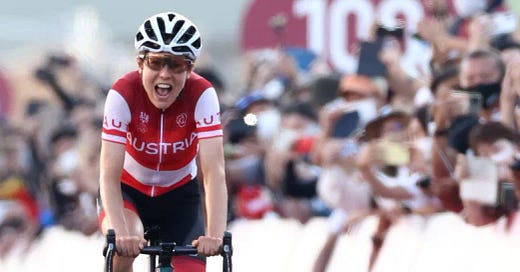Good afternoon, this is the first edition of Innovation Exchange that is going out on Substack, rather than via Mailchimp. As always feedback is very welcome. I’m on holiday this week. I was going to set this up and send it on Wednesday. But as I watch the evocative scenes from the closing ceremony at the Tokyo Olympics, I’m moved to send this to you early. The next edition will come to you on Wednesday the 18th aka ‘normal service’. Have a great week - Ved.
Higher, Faster, Stronger… Broader.
Anna Kiesenhofer, an amateur cyclist, won the 137 km cycling road race in Tokyo by such a big margin that the second place finisher, the professional cyclist Annamiek Van Vleuten thought she had won gold when she crossed the finish line because Kiesenhofer was nowhere in sight! For me this was probably the most inspiring story of the Olympics 2020. The value of multi-disciplinary people in a world that is increasingly specialised is immeasurable. Of the many qualities I look for in finding people, few things excite me as much as multi-faceted people. Because, you see, Anna Kiesenhofer has a Ph.D in higher mathematics and she currently works as a post doctoral researcher in Lausanne. It was quite impressive therefore that she would line up against the professional athletes for the 137 km cycling road race at the Tokyo Olympics, let alone storm to such a resounding victory. She's not alone though, Gaby Thomas earned a bronze and a silver medal for individual and relay sprinting, also in the process earning the soubriquet of the 'worlds fastest epidemiologist' - as she is currently working for her Master's degree at Harvard University. Another great testiment to versatility.
The reason for the value of multidisciplinary people in innovation is obvious. It provides you with a wider set of tools and frameworks with which to approach a problem. Every discipline arms you with its own models for problem solving, and the tools and mental frameworks of a software developer, a mathematician, an epidemiologist, and an olympic sprinter, are all different. But combining them can offer a much more kaleidoscopic approach to the same problem space. It's like the value of intellectual diversity but delivered through a single person. And the single person model is better because the synaptic connections in the brain are far richer, faster, and more complex than what can be achieved even by well organised groups.
After all some of the worlds greatest innovations have been the product of combinatorial ideas in one person's brain. In the 15th century, Gutenberg created the printing press by combining Chinese typesetting techniques with Italian wine making presses, along with his own metallurgical skills. In the 21st Century, Steve Jobs is seen as one of the eminent innovators of our times. Jobs was a tinkerer in many disciplines, from typography, to electronics, and his range of interests went from literature to spiritualism. The discovery of the double helix structure of the DNA owes much to the crystallography work done by Rosamund Franklin, and others. In fact almost every breakthrough invention or innovation has the thumbprints of multidisciplinary teams or individuals imprinted on their story.
The Olympics is itself an explosion of multi-disciplinarian feats. It's hard to not get sucked into the excitement of the games when it happens. From synchronised driving to the Madison cycling. despite our very limited technical knowledge, the thrill of the contest and the high stakes between glory and disappointment that a few seconds can define keeps us at the edge of our seats.
Apart from the stories of Kiesenhofer and Thomas, there was much that was different about this Olympics. Shorn of crowds and spectators, it felt like the athletes picked up the mangle of being each others' cheering squads, sometimes across national and team lines. When Gianmarco Tamberi and Mutaz Barshim decided to share the gold medal for the high jump, or when Abdi Nageeye egged on his training partner Bashir Abdi over the last kilometer of the marathon to join him on the podium, for silver and bronze. When senior competitors provided confidence boosting words of encouragement to Sky Brown, the 13 year old who had crashed in her first two runs, or when all the competitors let out a collective whoosh and applauded as Tom Daley aced his last dive. It felt like this was a new way to compete and an appropriate way to mark the challenges of the past 18 months. Sport unites. And that is perhaps its greatest contribution to our world today.
Reading This Week
Apple will introduce software that will scan all phones for child-sex images in the US. This is both a good thing and bound to be divisive. Expect debates.
Is IBM Watson finally on the maturity stage of the hype curve?
Vaccines: Do they work? Yes. Here’s the data
Bots of war: Are you ready for autonomous killer robots?
Barcelona after Messi by Simon Kuper in the FT - a long way from Cruyff, with crippling debt and poor management - means FC Barcelona are in a hole of their own making. As the picture below shows, Barcelona are among the worst performers when it comes to the wage bill as a percentage of revenues.
Survivorship bias: an interesting cognitive thinking crutch we need to avoid - as explained through the story of Shark attacks.
PS. Don’t forget to tune in to the Paralympics in a couple of weeks.




